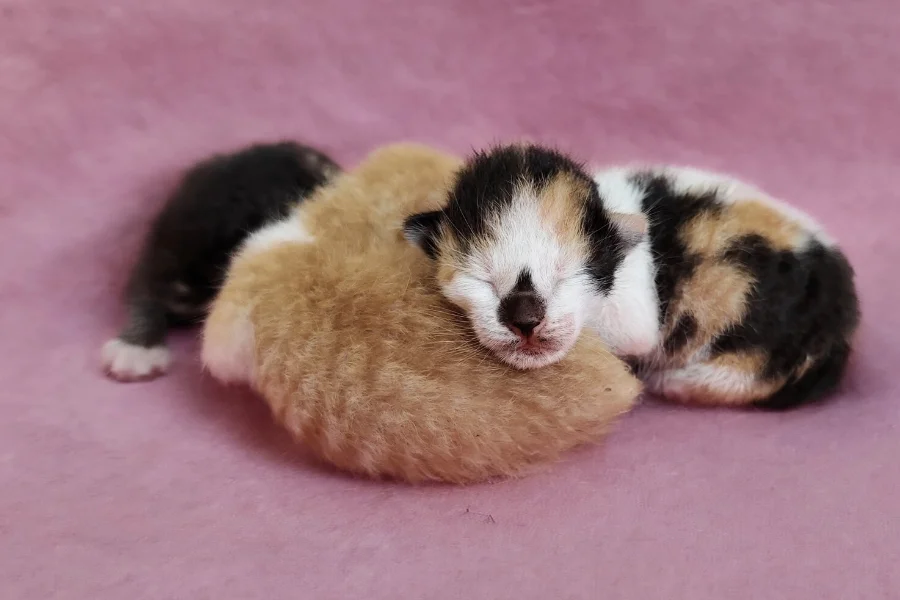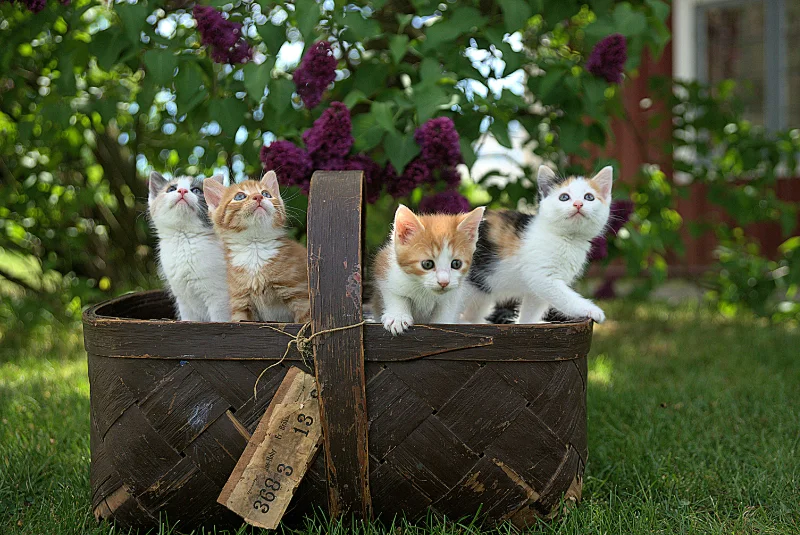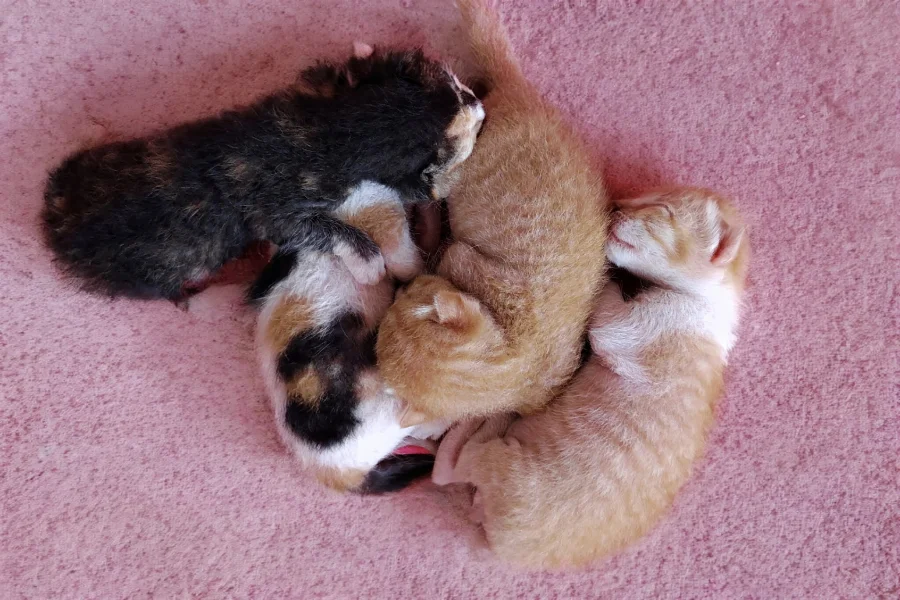Welcoming a newborn kitten into your home is a special journey of caring for and bonding with your furry companion. It’s crucial to keep your kitten warm and secure, particularly in the early stages of life when they are most susceptible without their mother. Be sure to provide nutrition with a kitten milk replacer and slowly transition to solid foods. This guide will help you give your kitten a strong foundation for a happy and healthy life ahead.
- Understanding Newborn Kitten
- Preparing Your Home for a Newborn Kitten
- Feeding Guidelines for Newborn Kitten
- Monitoring Health and Growth
- Bathing and General Hygiene
- Keeping Your Kitten Warm
- Socializing Your New Kitten
- Litter Training Your Kitten
- Health Care Essentials
- Understanding Behavioral Traits
- To wrap up
Key Takeaways:
- Warmth: Newborn kittens require warmth; keep them warm by wrapping them in a blanket and holding them close if they feel cold.
- Socialization: Interact with your kitten regularly to aid in socialization. Consider adopting multiple kittens for companionship.
- Feeding: Introduce solid food at around 4-5 weeks by mixing it with kitten formula, and provide fresh water at all times.
- Vaccination: Start vaccinations at 6 weeks to protect against common feline diseases with follow-ups every 3-4 weeks until 4 months old.
- Essential Supplies: Equip your home with necessary gear like litter boxes, feeding bowls, brushes, a scratching post, and stimulating toys.
Understanding Newborn Kitten
New pet owners need to understand newborn kittens to ensure proper care. Kittens rely on their mothers for nourishment and warmth. If the mother isn’t present, you’ll need to provide support by keeping the kitten warm and feeding them a special milk replacer. Understanding their needs at this stage is crucial for their health and growth.

Importance of Early Socialization
Early socialization is crucial for newborn kittens. Interacting with them during their formative weeks builds confidence and helps them adapt to different situations. Positive experiences with handling, other pets, and various sounds shape a well-rounded adult cat. Skipping this phase can result in behavioral problems and make social interactions challenging in the future.
Exposing your kitten to various situations is crucial during this period. Cats that are less anxious and more adaptable tend to have better relationships with humans, improving your overall experience together. Early interactions can boost their comfort level, leading to a balanced, happy adult cat. Taking the time to socialize with your kitten early on can greatly impact their behavior and temperament for life.
Preparing Your Home for a Newborn Kitten
Creating a Safe Space
Your kitten’s comfort and safety should be your top priority. Set up a cozy area that shields them from loud noises, drafts, and other pets. This protected zone will help your kitten build confidence as they explore their new environment, promoting both comfort and socialization.
Environmental Enrichment
Enhance your kitten’s instincts with toys, scratching posts, and climbing structures for physical and mental stimulation. This will entertain and develop your kitten while preventing future behavioral issues.
Enrichment activities are crucial for a growing kitten. Use cardboard boxes, soft blankets, and safe climbing areas to mimic their natural habitat. Rotate toys to keep them interested. A playful atmosphere helps kittens develop skills and stay healthy.
Supplies and Equipment Needed
With the right supplies, your kitten can thrive in their new home with items such as a litter box, food and water bowls, a scratching post, and toys.
Invest in high-quality kitten food, a cozy bed, and several litter boxes to avoid accidents. Provide safe toys to keep your kitten entertained and ensure that the environment is free from dangerous hazards.
Feeding Guidelines for Newborn Kitten
Taking care of newborn kittens requires close care, especially when it comes to feeding. If the mother cat is not present, it is important to provide the right nutrition with a specialized kitten milk replacer. Newborn kittens require a milk replacer high in protein and fat to mimic their mother’s milk.
Feeding should begin soon after birth to guarantee their health and survival in the critical early weeks. These young felines need to gain weight steadily, roughly 10% of their body weight daily, to ensure healthy development. Always consult with your veterinarian to choose the best formula suited for your kittens.
Bottle-Feeding Techniques
Guidelines for bottle-feeding kittens: use a specialized nursing bottle and warm formula to body temp. Hold the kitten belly-down, and use a nipple that allows steady milk flow. Be patient, some kittens may take time to learn. Rub formula on lips if they struggle. Ensure a comfortable nursing position to prevent stress.
Monitoring Health and Growth
Not all newborn kittens show the same growth trajectory, so monitoring their development closely is imperative. As a responsible caregiver, you should observe their behavior, weight, and overall health to ensure they are thriving during their early weeks.
Normal Growth Patterns
Growth in kittens typically follows a steady trajectory. From birth to around four weeks, you can expect your kitten to double their birth weight. After this period, their rate of growth may slow slightly, but they should continue to steadily increase weight and size as they transition to solid food.
Newborn Kitten Weight Gain Expectations
One of the key indicators of your kitten’s health is consistent weight gain. Ideally, a healthy kitten should gain between 10 to 15 grams (0.35 to 0.53 ounces) per day in the first few weeks of life.
Expectations should be set high when it comes to weight gain in the first weeks. If your kitten consistently gains weight within the ideal range, they are likely receiving adequate nutrition. However, keep an eye out for any fluctuations, as sudden weight losses or stagnation can indicate health issues that require veterinary attention.
Recognizing Health Issues
Along with monitoring growth, it’s important to recognize any signs of health issues early. Watch for symptoms such as lethargy, lack of appetite, or abnormal behavior, which can indicate potential concerns.
Health issues in kittens can develop rapidly, so it’s imperative to be vigilant. Early signs of trouble, like persistent vomiting or diarrhea, should prompt immediate veterinary consultation. Being proactive can be lifesaving, as timely intervention is often key to ensuring your kitten grows up healthy and strong.
Bathing and General Hygiene
Kittens are usually good at grooming but may need help if they get messy. Keeping them clean is important for their health and comfort. Be gentle when bathing and grooming your kitten.
When and How to Bathe
At around 8 weeks old, your kitten may require a bath if they’ve gotten into something dirty. Use a gentle, fragrance-free shampoo specifically formulated for cats, and ensure the water is lukewarm. Start by wetting their fur gradually, avoiding their ears and eyes, and then apply the shampoo while massaging it in. Rinse thoroughly to prevent any irritation.
Cleaning the Ears and Eyes
Bathe your kitten’s face gently with a damp cloth to clean their eyes and ears, using vet-approved cleaner for ears. Regularly check and wipe eyes and ears to prevent infections, consulting a vet if needed.
Grooming Essentials
The proper grooming tools can simplify caring for your kitten’s hygiene. Important items to have include a soft brush, comb, and nail clippers. Starting grooming early can create a positive experience and strengthen your bond. Regular brushing with a soft brush helps reduce hairballs. Grooming your kitten regularly keeps them healthy and aids in detecting skin issues early. Use treats to reward your kitty during grooming sessions.
Keeping Your Kitten Warm
Keep your newborn kitten cozy as they struggle to regulate their body temperature effectively in the early weeks. If orphaned or separated, it’s up to you to provide a warm, safe environment. Keep the temperature around 85-90°F at first, gradually decreasing to 70°F as they get older, as warmth is crucial for their survival and growth.
Recommended Heating Methods
Here are some ways to keep your kitten warm: use a heating pad on low, a hot water bottle wrapped in a towel, or a cozy blanket in their sleeping area. Position them safely so they can move if it gets too warm. Providing a warm, enclosed space can make them feel secure and nurture their instincts.
These methods help keep your kitten comfortable, especially a heating pad that mimics their mother’s warmth. Monitor the temperature closely and provide a way for the kitten to escape the heat if needed. Ensure items used are safe to prevent accidents.
Signs of Hypothermia and How to Respond
If your kitten shows signs of hypothermia, such as cold ears, limbs, lethargy, and lack of appetite, act quickly by safely warming them. Avoid direct heat sources, wrap them in a warm blanket, or hold them close to transfer heat.
Respond promptly by using your body heat or a low-heat heating pad. Keep their environment at 85-90°F until they can regulate their heat. Swift action to address temperature issues can protect your kitten and promote a healthy start.
Socializing Your New Kitten
Importance of Early Interaction

Besides building trust, early interaction significantly impacts your kitten’s overall behavior and temperament. Kittens learn social cues during their formative weeks, and positive experiences now will lead to a more friendly, balanced adult cat later on.
Techniques for Gentle Socialization
Create safe spaces for your kitten to explore and feel secure at home. Use gentle techniques like petting and interactive play with toys to bond with them. Gradually introduce them to new environments, sounds, and sights for adaptability.
Slowly introduce your kitten to social situations to assist with their acclimation. Utilize toys that mimic prey and practice gentle handling for physical contact. Provide opportunities for curiosity and encourage confident exploration.
Introducing to Other Pets
Introducing your new kitten to existing pets can be rewarding with patience. Keep a safe distance at first, allowing observation without threatening. Thoughtful introductions are key, starting with smelling each other’s belongings and supervised meetings.
Use positive reinforcement like treats to encourage friendly behavior. Monitor closely and provide separate spaces if needed for a harmonious household.
Litter Training Your Kitten
Many new kitten owners wonder about the best way to litter train their furry friend. The good news is that most kittens have an instinctive tendency to bury their waste, making the training process relatively straightforward.
Choosing the Right Litter Box
Training your kitten starts with selecting the right litter box. Choose one that is low-walled and spacious, allowing your kitten easy access. As a general rule, have one litter box per cat plus one extra to avoid accidents.
Techniques for Effective Training
Choose effective training techniques for your kitten by providing supervision and encouragement. Place your kitten in the litter box after meals and playtimes to establish good habits. Offer praise and rewards for using the litter box to reinforce positive behavior. Maintain a clean litter box to keep them interested.
Solving Typical Problems with Litter
Over time, you may notice issues with your kitten’s litter habits, such as going outside the litter box. This could be caused by various factors, including stress, a dirty litter box, or an unsuitable box.
To solve your kitten’s litter training issues, clean the box daily, try different litter types, and eliminate stressors like loud noises or disruptions in their routine.
Health Care Essentials
Stay informed about vaccinations, parasite control, and veterinary visits to ensure a long and happy relationship with your pet.
Vaccination Schedules
One of the first responsibilities you have is to establish a vaccination schedule for your kitten, typically beginning around 6 weeks of age.
Kittens need a series of vaccinations that protect them from serious diseases such as feline distemper and rabies, which should be administered every 3 to 4 weeks until they are about four months old.
Worming and Flea Control
To prevent worm and flea infections, follow a preventive program recommended by your vet. Regular treatment ensures your kitten stays healthy and free from discomfort. Deworming at vet visits and key developmental stages is crucial to avoid nutrient deficiencies and ensure proper growth.
Regular Vet Checkups
Regular health checkups are essential for your new kitten, providing necessary vaccinations and screenings. Visiting a vet helps detect and prevent health issues early. A vet familiar with your kitten’s history can be beneficial for unexpected concerns. Personalized care and guidance during checkups help monitor growth and development, ensuring peace of mind about their well-being.
Understanding Behavioral Traits
Kittens are curious and energetic, showing their personalities through play, exploration, and social interaction. Understanding these behaviors will help foster a healthy environment for your kitten to thrive and grow into an adult cat.
Common Kitten Behaviors
To care for your new kitten, observe their common playful behaviors like pouncing and chasing. They may seek attention from you or interact with other pets for companionship.
Addressing Behavioral Problems
Sometimes, kittens can display signs of anxiety, such as excessive meowing or destructive scratching. Recognizing these behaviors early on allows you to take steps to correct them, ensuring a harmonious home.
When you notice disruptive behaviors, assess the cause and provide engaging toys or playtime. Redirect scratching to a scratching post and reward good behavior for a positive living environment.
Encouraging Positive Behaviors
To help your kitten grow, reward good behavior like using the litter box or playing gently. Bond with your kitten during playtime and encourage socializing. Use positive reinforcement like treats or praise to build confidence and trust. Invest time into your kitten’s development for a calm and friendly adult cat.
To wrap up
Conclusively, ensuring your newborn kitten receives the right care in their early weeks is vital to their growth and development. Keep them warm, introduce solid foods gently, and schedule necessary vaccinations. Engage with your kitten frequently to foster socialization, and consider adopting a playmate for them.
For further guidance on how to care for a literal today-newborn kitten, you can explore this How to care for a literal today-newborn kitten? : r/CatAdvice resource. Your commitment will create a loving and healthy environment for your feline friend.



